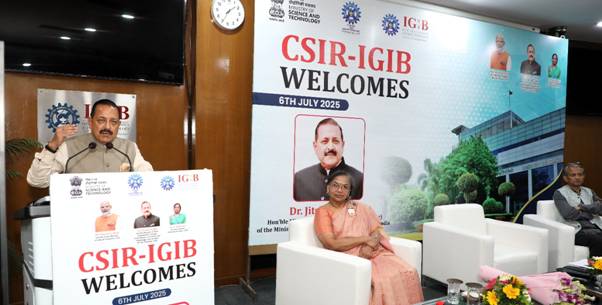



India's 'National Biobank' launched at CSIR-IGIB aims for personalized treatment. Collecting genomic, lifestyle, and clinical data from 10,000 diverse individuals, it aids early diagnosis and therapeutic targeting for complex diseases. This initiative addresses unique Indian health challenges, promoting indigenous innovations and self-reliance in healthcare data, marking a significant stride.

Copyright infringement not intended
Picture Courtesy: PIB
The Union Minister of State (Independent Charge) for Science & Technology inaugurated the state-of-the-art "National Biobank".
A biobank is a collection of biological samples and health information, usually from humans, stored for research.
Researchers use these samples and data to understand diseases, find new treatments, and develop personalized medicine.
They can store various samples such as blood, urine, or tissue, keeping them in good condition for future studies.
The Phenome India Project officially launched the National biobank.
|
What is the Phenome India Project (PI-CheCK)? The Phenome India Project is officially called the Phenome India-CSIR Health Cohort Knowledgebase (PI-CheCK). The Council of Scientific and Industrial Research (CSIR) launched this initiative in 2023. It is India's first-ever widespread, long-term health monitoring study that specifically focuses on cardio-metabolic health. |
"Personalised treatment," also called precision medicine, means doctors made medical decisions and treatments specifically for each patient. They consider a person's unique genetic information, lifestyle, and environment. This approach aims to provide "the right drug at the right dose in the right patient"
The National Biobank will collect detailed data, helping scientists understand the unique health patterns in India and develop treatments that work best for its diverse population.
It is a large, long-term health study in the United Kingdom that collects biological samples and health data from half a million participants. It gathers a wide range of information, including physical measurements, imaging data (like MRI scans), lifestyle surveys, and genetic analyses.
Researchers worldwide use this data to study common diseases like cancer, heart disease, and Alzheimer's, and understand how genes, lifestyle, and environment affect health.
India's National Biobank draws inspiration from this model but adapts it to capture India's unique diversity.
Source:
|
PRACTICE QUESTION Q. Consider the following statements: 1. Somatic cell gene therapy alters the genetic makeup of specific cells in a patient to treat a disease, and these changes are heritable. 2. Germline gene therapy modifies the genes in reproductive cells, ensuring that the genetic alterations are passed onto future generations. Which of the above statements is/are correct? A) 1 only B) 2 only C) Both 1 and 2 D) Neither 1 nor 2 Answer: B Explanation: Statement 1 is incorrect: The first part is accurate: somatic cell gene therapy involves modifying the genes in a patient's body cells (somatic cells), such as liver cells, blood cells, or skin cells, to treat a specific disease. However, the error is in the claim that these changes are heritable. Somatic cells are not involved in reproduction. Therefore, any genetic modifications made to them will only affect the individual patient and will not be passed on to their offspring. The genetic changes die with the individual. Statement 2 is correct: Germline gene therapy targets the genes in reproductive cells (germ cells), such as sperm or eggs, or in an early-stage embryo. Because these cells are the foundation for the next generation, any genetic alterations made to them will be present in every cell of the resulting offspring. Consequently, these changes are heritable and will be passed down to all subsequent generations. Due to the profound ethical implications of altering the human gene pool, germline gene therapy is highly controversial and is not practiced in humans. |






© 2026 iasgyan. All right reserved